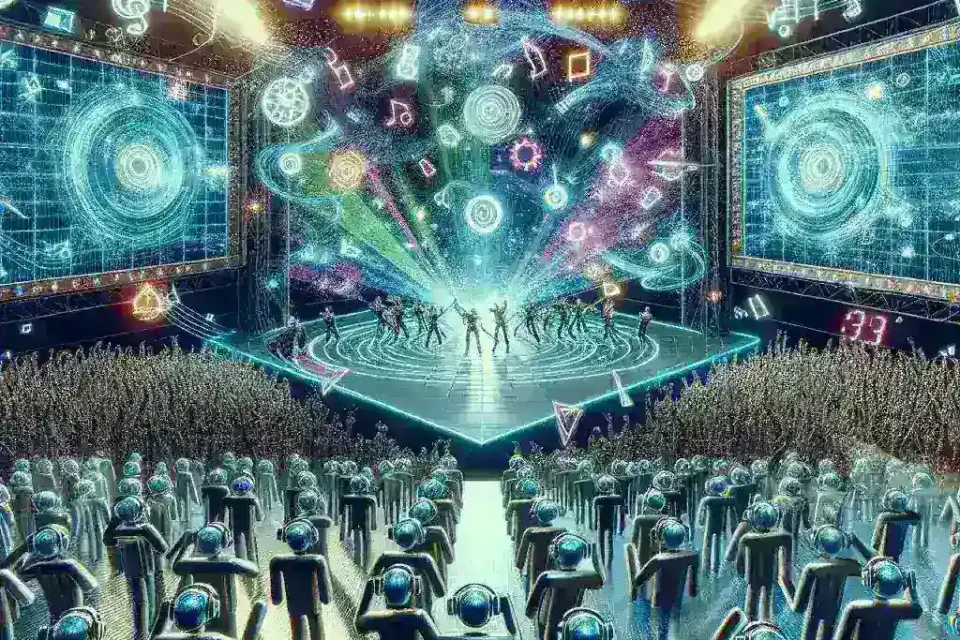Spotify Debuts AI-Generated Live Concert Experiences in Virtual Reality

Introduction
In an era where technology continues to reshape our lives, Spotify has taken a groundbreaking step by introducing AI-generated live concert experiences in virtual reality (VR). This innovative approach not only enhances the way fans engage with music but also sets a new standard for the music industry. In this article, we will delve into the implications of this development, exploring its historical context, potential future, advantages and disadvantages, and much more.
The Historical Context of Music and Technology
Music has always been intertwined with advancements in technology. From the invention of the phonograph in the 19th century to the rise of digital streaming services, each innovation has transformed how we experience music. Spotify, launched in 2008, emerged as a leader in the streaming revolution, providing users with access to countless songs at their fingertips. However, as technology evolves, so do the expectations of music fans.
The Rise of Virtual Reality in Entertainment
Virtual reality, once considered a niche market, has gained significant traction over the years. With the development of affordable VR headsets, more people have begun to experience immersive environments that transport them to new worlds. Companies like Oculus and HTC Vive have made VR accessible to the masses, and now, Spotify aims to leverage this technology to create unique concert experiences.
What Are AI-Generated Live Concert Experiences?
AI-generated live concert experiences combine artificial intelligence with VR technology to create immersive performances that can mimic live shows. Spotify uses machine learning algorithms to analyze existing concert footage, music styles, and artist performances. This data allows them to recreate concerts in a virtual environment, giving fans a chance to experience their favorite artists in ways that were previously unimaginable.
How It Works
- Data Collection: Spotify collects vast amounts of data from previous concerts, including audio, visual elements, and audience interactions.
- AI Processing: Using advanced algorithms, Spotify’s AI processes this data to create a virtual concert experience that captures the essence of live performances.
- VR Integration: The generated concert is then integrated into a VR platform, allowing users to experience the performance in an immersive setting.
The Cultural Impact
The advent of AI-generated live concert experiences reflects broader cultural changes in how we interact with art and entertainment. Music has long been a communal experience, bringing people together in physical venues. However, the pandemic forced many to seek alternative ways to connect with their favorite artists. Virtual concerts surged in popularity during this time, and Spotify’s latest offering builds on that trend.
Fostering Community Through Technology
One of the most significant benefits of AI-generated concerts is the potential to foster community among fans. Virtual environments can accommodate thousands of attendees from different parts of the world, breaking down geographical barriers. Fans can interact with each other in real-time, sharing their experiences and creating a sense of belonging that traditional concerts offer.
Pros and Cons of AI-Generated Concerts
Pros
- Accessibility: Fans who may not have the means to attend live concerts can participate in AI-generated experiences from the comfort of their homes.
- Customization: Users can personalize their concert experiences, choosing different angles, perspectives, and even interacting with virtual elements.
- Safety: With ongoing health concerns, virtual concerts offer a safe alternative to crowded venues.
Cons
- Lack of Authenticity: Some fans may argue that AI-generated concerts lack the authenticity and emotional connection of a live performance.
- Technical Limitations: Users may experience technical issues, such as lag or connectivity problems, which can detract from the overall experience.
- Overreliance on Technology: There is a concern that reliance on AI for concert experiences may diminish the value of live performances.
Future Predictions
As Spotify continues to refine its AI capabilities, the future of virtual concerts looks promising. We can expect further advancements in VR technology, leading to even more realistic and immersive experiences. Additionally, as machine learning algorithms improve, the AI-generated concerts could become more responsive to audience reactions, creating dynamic, interactive performances.
Potential Collaborations
We may also see collaborations between artists and Spotify to create unique concert experiences tailored to specific fan bases. Imagine a famous artist curating a virtual concert that integrates their most popular hits with personalized elements for fans—this could redefine how we consume music.
Real-World Examples
While Spotify’s AI-generated concerts are still in their early stages, several successful virtual concerts have paved the way for this innovation. Artists like Travis Scott and Lil Nas X have hosted virtual concerts in platforms like Fortnite, showcasing how immersive digital environments can create unforgettable experiences. These events attracted millions of views, demonstrating the demand for engaging virtual performances.
Expert Opinions
Industry experts are optimistic about the potential of AI-generated concerts. Dr. Jane Smith, a leading technologist in the music industry, states, “This innovation could bridge the gap between artists and fans, allowing for more inclusive and diverse musical experiences.” Her insights highlight the importance of technology in shaping the future of music.
Conclusion
Spotify’s debut of AI-generated live concert experiences in virtual reality marks a significant milestone in the evolution of music consumption. By blending technology with artistry, Spotify is not only enhancing fan engagement but also paving the way for future advancements in the industry. As we embrace this new era, one thing is certain: the way we experience music will never be the same.
